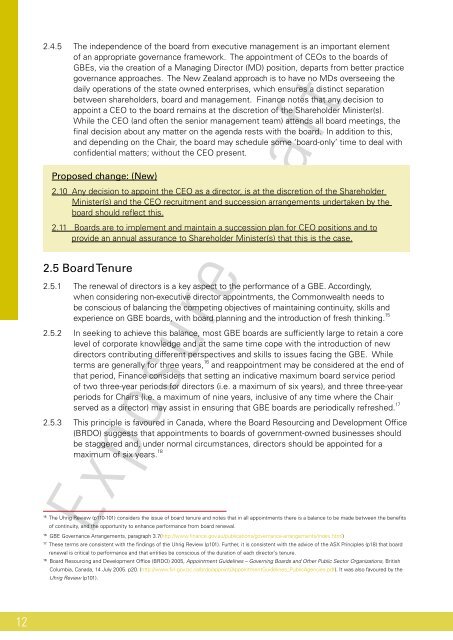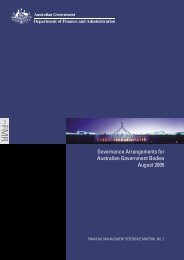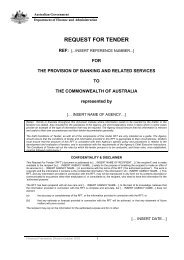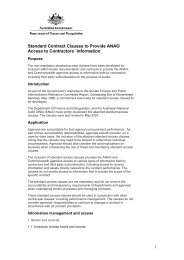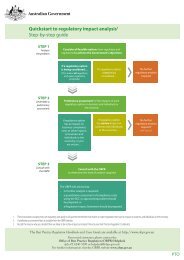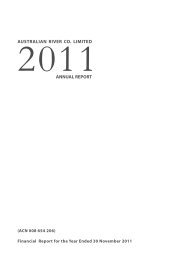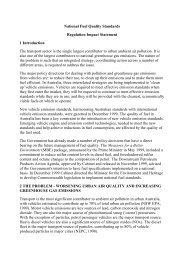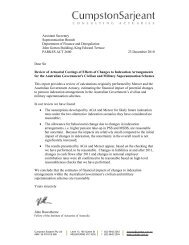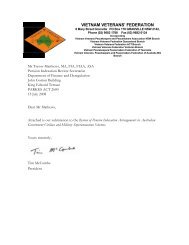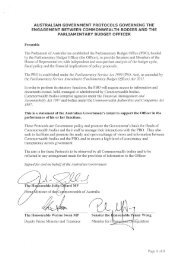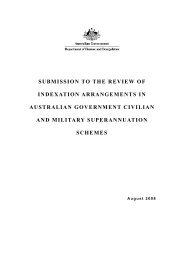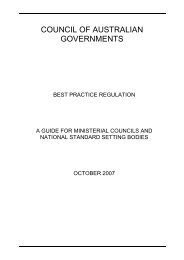Review of Commonwealth Government Business Enterprises ...
Review of Commonwealth Government Business Enterprises ...
Review of Commonwealth Government Business Enterprises ...
You also want an ePaper? Increase the reach of your titles
YUMPU automatically turns print PDFs into web optimized ePapers that Google loves.
12<br />
2.4.5 The independence <strong>of</strong> the board from executive management is an important element<br />
<strong>of</strong> an appropriate governance framework. The appointment <strong>of</strong> CEOs to the boards <strong>of</strong><br />
GBEs, via the creation <strong>of</strong> a Managing Director (MD) position, departs from better practice<br />
governance approaches. The New Zealand approach is to have no MDs overseeing the<br />
daily operations <strong>of</strong> the state owned enterprises, which ensures a distinct separation<br />
between shareholders, board and management. Finance notes that any decision to<br />
appoint a CEO to the board remains at the discretion <strong>of</strong> the Shareholder Minister(s).<br />
While the CEO (and <strong>of</strong>ten the senior management team) attends all board meetings, the<br />
fnal decision about any matter on the agenda rests with the board. In addition to this,<br />
and depending on the Chair, the board may schedule some ‘board-only’ time to deal with<br />
confdential matters; without the CEO present.<br />
Proposed change: (New)<br />
2.10 Any decision to appoint the CEO as a director, is at the discretion <strong>of</strong> the Shareholder<br />
Minister(s) and the CEO recruitment and succession arrangements undertaken by the<br />
board should refect this.<br />
2.11 Boards are to implement and maintain a succession plan for CEO positions and to<br />
provide an annual assurance to Shareholder Minister(s) that this is the case.<br />
2.5 Board Tenure<br />
2.5.1 The renewal <strong>of</strong> directors is a key aspect to the performance <strong>of</strong> a GBE. Accordingly,<br />
when considering non-executive director appointments, the <strong>Commonwealth</strong> needs to<br />
be conscious <strong>of</strong> balancing the competing objectives <strong>of</strong> maintaining continuity, skills and<br />
experience on GBE boards, with board planning and the introduction <strong>of</strong> fresh thinking. 15<br />
2.5.2 In seeking to achieve this balance, most GBE boards are suffciently large to retain a core<br />
level <strong>of</strong> corporate knowledge and at the same time cope with the introduction <strong>of</strong> new<br />
directors contributing different perspectives and skills to issues facing the GBE. While<br />
terms are generally for three years, 16 and reappointment may be considered at the end <strong>of</strong><br />
that period, Finance considers that setting an indicative maximum board service period<br />
<strong>of</strong> two three-year periods for directors (i.e. a maximum <strong>of</strong> six years), and three three-year<br />
periods for Chairs (i.e. a maximum <strong>of</strong> nine years, inclusive <strong>of</strong> any time where the Chair<br />
served as a director) may assist in ensuring that GBE boards are periodically refreshed. 17<br />
2.5.3 This principle is favoured in Canada, where the Board Resourcing and Development Offce<br />
(BRDO) suggests that appointments to boards <strong>of</strong> government-owned businesses should<br />
be staggered and, under normal circumstances, directors should be appointed for a<br />
maximum <strong>of</strong> six years. 18<br />
Exposure Draft<br />
15 The Uhrig <strong>Review</strong> (p110-101) considers the issue <strong>of</strong> board tenure and notes that in all appointments there is a balance to be made between the benefts<br />
<strong>of</strong> continuity, and the opportunity to enhance performance from board renewal.<br />
16 GBE Governance Arrangements, paragraph 3.7(http://www.fnance.gov.au/publications/governance-arrangements/index.html)<br />
17 These terms are consistent with the fndings <strong>of</strong> the Uhrig <strong>Review</strong> (p101). Further, it is consistent with the advice <strong>of</strong> the ASX Principles (p18) that board<br />
renewal is critical to performance and that entities be conscious <strong>of</strong> the duration <strong>of</strong> each director’s tenure.<br />
18 Board Resourcing and Development Offce (BRDO) 2005, Appointment Guidelines – Governing Boards and Other Public Sector Organizations, British<br />
Columbia, Canada, 14 July 2005. p20. (http://www.fn.gov.bc.ca/brdo/appoint/AppointmentGuidelines_PublicAgencies.pdf). It was also favoured by the<br />
Uhrig <strong>Review</strong> (p101).


